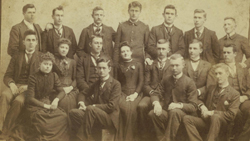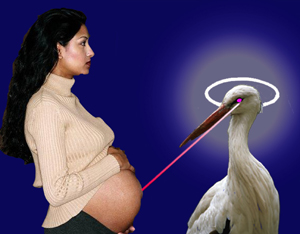Jackson, Mississippi - In a move that has sent ripples of controversy through the southern United States, especially among the scientific community, the Mississippi Legislature has recently renewed a 1996 bill that makes it illegal for public school science instructors to exclusively teach the theory that sex leads to reproduction. According to the bill, teachers must grant equal time to the alternate theory - known as "storkism" - which holds that a divine stork implants embryonic babies into women. The bill has continued to draw strong criticism from numerous educational institutions, fertility clinics, and school teachers throughout the state.
Mississippi's Press Secretary Johnny Mabus defended the bill at a press conference, "All it does is ensure that both sides of the issue are presented so that students can make up their own minds. Nobody is there inside the woman when pregnancy begins, so nobody except our Lord is really qualified to say what happens. It is simply irresponsible to treat one or the other theory as solid fact." Added Mabus, "Especially when that whole fornication leading to babies thing is obviously ridiculous."
 The Mabus Family in a 1995 Portrait
"None of us would be here in this photo if it wasn't for the divine stork. What more proof do you want?"
- Jack Mabus, 1996 |
Specifically, the bill requires teachers to add certain caveats to their lectures no fewer than ten times per hour when presenting material which might possibly suggest any favoritism towards the mainstream theory. Examples of acceptable caveats are given in their teaching handbooks, such as "...that is, if you believe that sex has anything to do with pregnancy, which it probably doesn't," and "...even though it might seem like people who don't have sex don't get pregnant in essentially 100% of all cases, you should never forget how misleading percentages can be." Additionally, only certain textbooks may be used, such as "Reproductive Science: A Strawman Approach" by Fred Mabus, and "Believe in Storkism or Suffer Eternal Damnation" by George Mabus.
Unplanned teen pregnancy in Mississippi has risen 560% since the bill was first enacted in 1996, although Lieutenant Assistant Deputy Assistant Press Secretary Kenny Mabus argued that these statistics were misleading, since "clearly, percentages greater than 100 must be made up".
As a result, Mississippi now has by far the highest poverty rate in the United States, along with an increasing population of underprivileged children with parents who are economically and socially unequipped to handle the burdens of child rearing. To address this, the state legislature has instituted a bi-monthly State Day of Prayer. Several lawmakers have advocated increasing the frequency of the Day of Prayer to monthly if the crisis continues. HSP





 FACEBOOK
FACEBOOK REDDIT
REDDIT STUMBLEUPON
STUMBLEUPON DEL.ICIO.US
DEL.ICIO.US











